As your baby’s teeth start to grow in, you may start receiving an increased dose of nipple biting when you breastfeed your little one.
That said, nipple biting isn’t to be blamed on the teeth alone, but rather the necessary changes that need to be made to accommodate your baby’s new pearly whites, alongside other potential reasons for your baby biting away at his main food source.
These reasons can range from just a simple change of comfort while breastfeeding to something a bit more annoying for your child, like the irritation of your baby’s gums as his new teeth begin to come in.
The reason I say it’s not the teeth specifically stems from a bit of common sense earned from mommyhood.
While I initially thought it did, one of my fellow moms explained it rather simply to me: Babies aren’t trying to bite on the breast to get the milk out, they suck on it, the same way any other human does when performing a similar motion like drinking from a bottle.
We don’t gnaw on the plastic end, we simply place our lips on it and suck to get enough for a gulp. Our babies do the same.
That’s why when your baby bites down on your nipple during a nursing session, it’s likely there’s another reason, and, with a bit of practice and a keen eye, you’ll be able to deduce exactly why.
Why Your Baby Bites Your Nipples During Breastfeeding
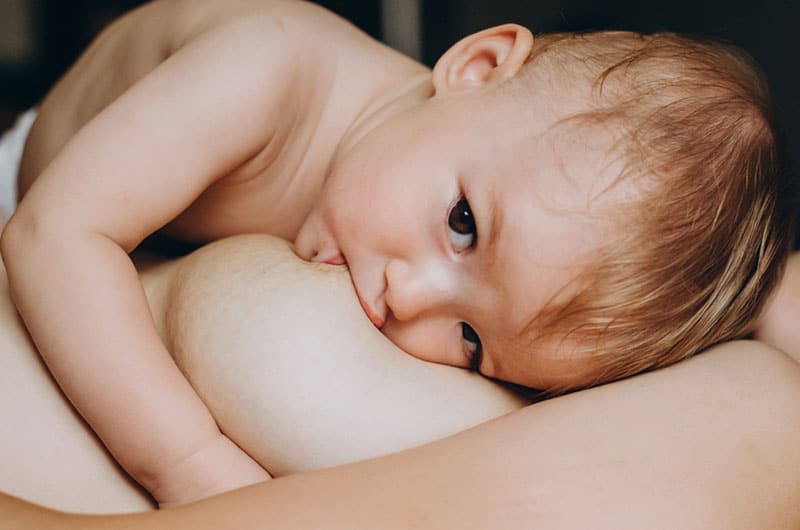
The most important thing to uncover when your baby starts biting your breast all of a sudden is the reason behind it, because then you’ll know exactly how to remedy the situation.
Now, there are several potential reasons, and here are some of the most common:
– You’re providing a bad latch. Now, this isn’t a problem you’re knowingly causing.
You see, when your little one’s teeth start coming in, your baby’s jaws, both upper and lower, start to change the shape of his mouth.
His lower teeth start carrying a bit more impact due to the lower jaw being the one mobile part of the mouth, and it becomes much harder to maneuver for him if you’re still sticking to his original breastfeeding position.
– Your baby is teething. It’s simple, your baby’s teeth are coming in and your little one is trying to get accustomed to using them.
He’s trying to use them wherever he can to experiment with his newly available toolset and sometimes your breast is simply a prime teether, given its soft texture.
– Your little one’s suffering from gum irritation. Normally this ties into the teething since part of it: irritation of both the upper and lower gums as the teeth start coming in.
But it can also sometimes be due to an infection, depending on what your child had previously put in his mouth to chew on and similar.
It’s nothing uncommon, I assure you, as many kids want to gnaw on anything at the start.
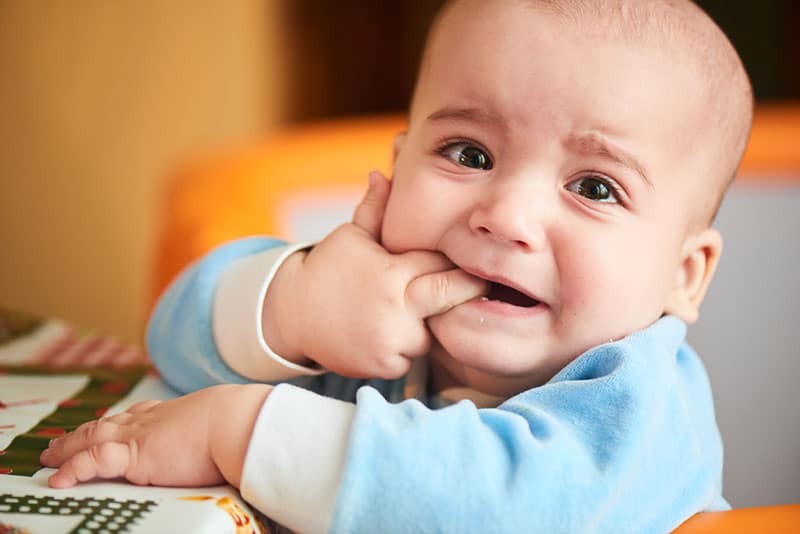
– Your child is feeling bored or drowsy. Another uncommon thing to face is the fact that your baby may simply be bored or the weather may be affecting him.
Or he could simply be tuckered out, which leaves his focus scattered and his mind to waver, leading to an accidental pinching nipple bite. Nothing too serious to fault the baby over, that’s for certain.
– He might be fussy or restless. On the opposite end of things, it might be that your little one is overflowing with energy and is hyperactive, leading to him wanting to expend that excess energy in any way he can.
You can usually spot this if your baby is wriggly while you’re holding him and is balling his fists.
Naturally, he’ll also try biting down on occasion as well without realizing that the action is going to hurt you, but don’t fault him for that, he doesn’t know any better.
– Your baby is suffering from an ear infection or heavy cold. The reason for these two specifically is because being affected by either of these cases leads to a heavy dulling of the senses, leaving your baby to not really have a feel for when he’s latched on properly or not.
Thus, just to be safe, he ends up biting during breastfeeding to ensure he has a good latch to get all of the milk he needs for that nursing session.
– He’s really hungry and trying to get more milk. Let’s face it.
Kids, much like grown adults, can sometimes be greedy about the things they want and food is no exception. That goes doubly so for our little rascals.
The problem is that they can’t really signal us that they want more in any noticeable way other than loud crying or to have our babies bite down hard thinking that will get the milk flowing faster.

– He wants your attention. Your little one may notice that your eyes are wandering over to your phone or TV screen, or that you’re simply focusing on a conversation with your partner or friend, and your baby then ends up feeling jealous that he’s not the object of your attention.
So, he tries to catch your attention, to get you to make eye contact with him again, but when everything else fails, he ends up biting down on your nipple hoping that the pain turns your gaze toward him.
– He thinks it’s fun. You may have been bitten before and you’ve reacted in a manner that may have appeared entertaining to your child, whether it was a scream, a yelp, or even an attempt at forced laughter.
Whatever the case, your little one took it in as a cute thing and has now made it a habit to try to get you to repeat the reaction.
Again, nobody’s to blame here because your child doesn’t know it’s bad, and you didn’t know that reacting in such a manner would lead to this.
– He’s trying to cope with the increased milk flow from a strong letdown reflex.
Sometimes, due to an oversupply of milk or a simple case of breast engorgement, one of your letdowns ends up hosing the baby’s mouth with milk, overwhelming your poor child.
This then leaves him with no other option than to try and bite down on the nipple in hopes of stopping the tidal wave of breast milk from overwhelming him.
The important thing to note here though is that these reasons aren’t mutually exclusive.
Just because your baby is trying to use your poor nipple as his new teething toy doesn’t mean that he might not also be struggling with a bad latching position.
It’s important to pay attention to what precisely is causing these issues, then it’s easy enough to eliminate through the right preventive measures.
Preventing Baby Biting During Breastfeeding In The First Place

While there are many different reasons for your baby to bite down, the preventive measures aren’t as numerous, but they each do manage to remedy a number of the aforementioned reasons.
– Not reacting abruptly when nipple biting occurs.
While the initial bite may feel like a small nip at the nipple flesh, if you scream loudly or create any sort of distracting grimace, it may actually make matters worse.
You may either end up scaring your baby to the point where he starts crying and actually bites down even harder in hopes of making you stop, or, he may find your reaction priceless and make a mental note that he should do it more often for entertainment value.
The best thing you can do is to clench your own teeth and keep as level-headed and expressionless as possible (at worst a slight gasp!)
– Following it up by carefully moving your child off of the breast.
In order to not cause any further harm, you need to continue acting calmly in this situation by putting a pause on feeding time and setting your little one down and away from the breast.
Under no circumstances should you try to tear him off it as that may risk further damage to your arguably already sore nipple.

Simply pull your baby in a bit closer to make him open his mouth a bit wider and make it easier for you to detach them from the breast.
Alternatively, break the seal the baby’s mouth forms around the breast by pushing a finger between the breast and the corner of his mouth to have it simply “plop” off.
It’s done in this manner so as to teach your child that such behavior nets him less feeding time.
Sure, he might end up upset for a bit afterward, but it’s necessary for him to start learning a bit of discipline and the fact that actions carry consequences.
– Always having a teething toy handy. If teething is the issue, you’ll want him to continue, but on something that’s meant to be used as a teether instead of your poor nipples, since teething is still healthy behavior.
You can even use something like a clean, damp washcloth as well, in case gum irritation is the cause, so he can soothe his teething pain through a healthier outlet.
This way your teething baby won’t feel like the very act of teething is wrong, but he’ll learn what he can and cannot use his chompers on and will hopefully leave your breasts away from the wrath of his pearly whites.
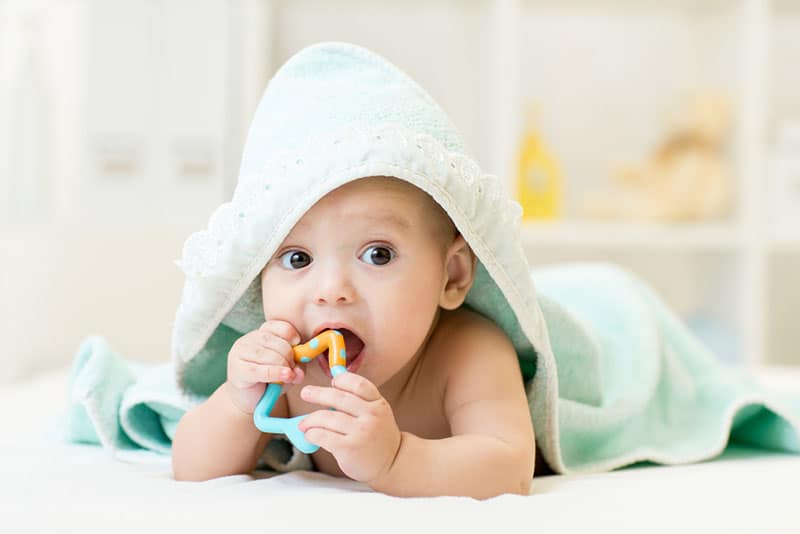
– Slightly adjusting the breastfeeding position. As mentioned earlier, when your baby’s teeth grow in, he may require a slight shift in his breastfeeding position to get proper breastfeeding support.
It’s this slight offset that can be the main cause for them biting down in hopes of holding on and getting a good latch going.
It’s also something that affects older babies as they grow larger, so you should practice actively adjusting your little one’s position during a nursing session every few weeks or so to ensure they’re latching properly.
– Nursing in a quiet room with no distractions. Loud rooms with lots of people can get distracting for the baby and even you.
It pays to have a nice, quiet spot – with exceptions to some soft, relaxing music playing in the background for ambience.
Then both you and your child end up being more relaxed and your nursing sessions are bound to go by without much issue.
Should I Get My Baby Off The Breast And Swap Over To Solid Foods?

This is something many mothers gravitate toward when they first feel their baby bite down.
While sometimes it might mean that your baby is ready for solid foods, you shouldn’t be making that decision on your own, especially if you’re a first-time mom with little experience in the matter.
Stick to what your lactation consultant(IBCLC) instructed you to do, as they only have your and your baby’s best interests in mind.
Some babies may start biting down early while some may take their time.
That’s why, even if the act might be bothering you, you should still continue with breastfeeding to provide your child with the necessary nutrients that breast milk provides them.
How To Treat A Breast Injury Caused By Nipple Biting
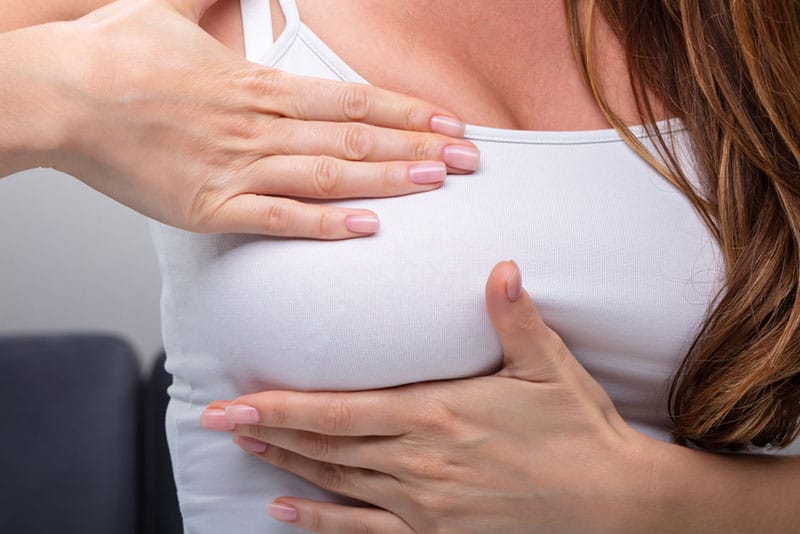
While most cases of nipple bites will only leave you with a short bout of stinging pain, sometimes you may end up being left with a bit of lasting damage.
These harsher results are either injured areolas, nipple fissures, or soreness around the nipple, and those can be treated in a number of ways.
– Nipple cream or saline rinse to soothe the affected area.
A simple nipple balm like lanolin or a soothing saline rinse can do wonders to help relieve the pain quickly and your nipple recover back to a state where you can have your baby nursing from that breast again.
– Cold compress. A classic means of remedying soreness or pain is applying an ice pack or a cold compress to an area to “draw the pain out,” so to speak, or rather to numb the area until the pain dissipates and let the skin heal properly without the unnecessary pain pangs.
– Let the affected side heal. Sometimes it’s best to simply let the injured breast heal on its own without using any specific treatments, allowing your body to do the regeneration for you.
You still have your second breast to keep the feeding up.
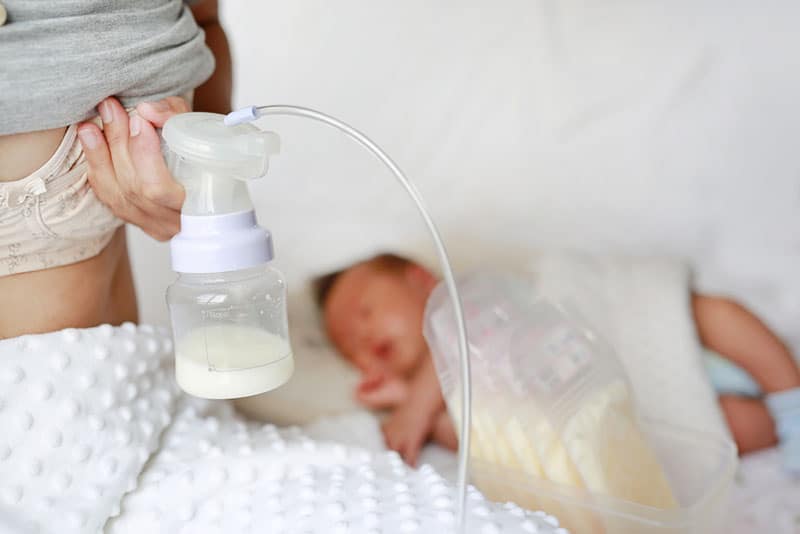
Though, do be careful that it doesn’t end up leading to breast engorgement on the injured breast from lack of regular draining.
If you can manage it, manually express some milk from the injured breast or opt for an electric breast pump to help regulate your milk supply and prevent complications like clogged milk ducts or mastitis – that’s the last thing you need to happen.
– If all else fails, over-the-counter pain relief medication.
If the pain ends up being too much for you to keep up with your daily duties and you simply cannot power through it, you can turn to meds like ibuprofen to help dull it.
But, it should only be used if none of the previous methods have helped, because a portion of everything you ingest does get transferred over into your breast milk.
So, do make sure to seek advice from your doctor or lactation consultant before considering this option.
In Conclusion

While it may sting, nipple biting isn’t some unnatural phenomenon.
Almost every mom is bound to suffer one or two nipple bites from their kids at some point during their nursing years.
What is important though is to react appropriately and to assess why your little one tried biting down in the first place by working through the list of potential reasons listed above.
If, however, you find that none of them are the cause, then you may want to seek out help from your lactation consultant or any other qualified healthcare professional so they can properly diagnose the cause for your child’s nipple biting and advise you on proper treatment.
Whatever the case may be, though, try to stay calm and know that your child isn’t trying to intentionally cause you harm.
He still loves you, it’s just that he’s limited in the way he can interact with you, so he resorts to one of his very limited options.
I’m sure that you’ll be able to overcome this issue regardless of the reason and that you’ll be back to spending quality time with your precious bundle of joy during your nursing sessions.
Like this post? Please share or pin it for later. You can also stay in the loop and follow us on Facebook, Instagram and Pinterest.
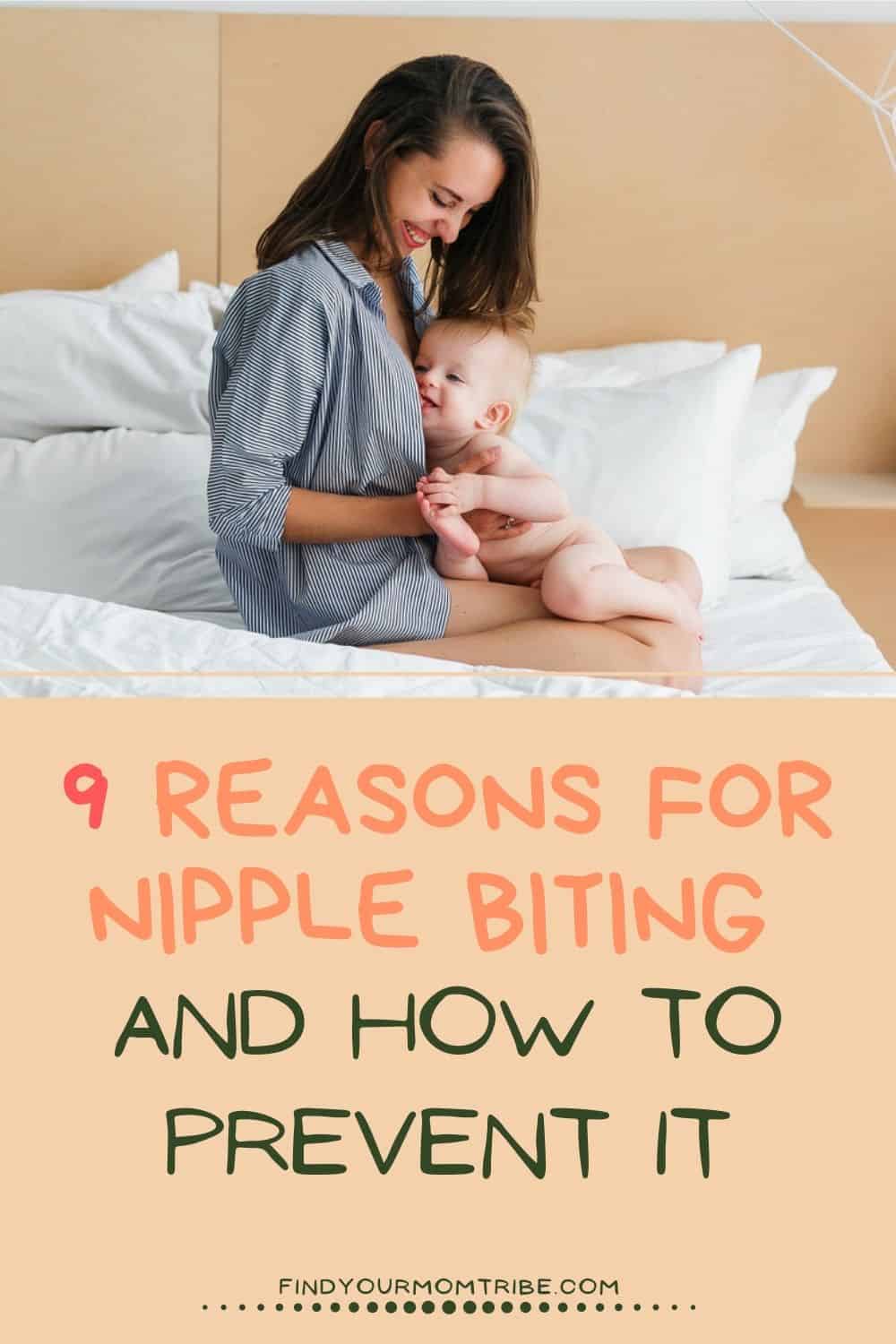
This post contains affiliate links. Please see our full disclosure for more info.

